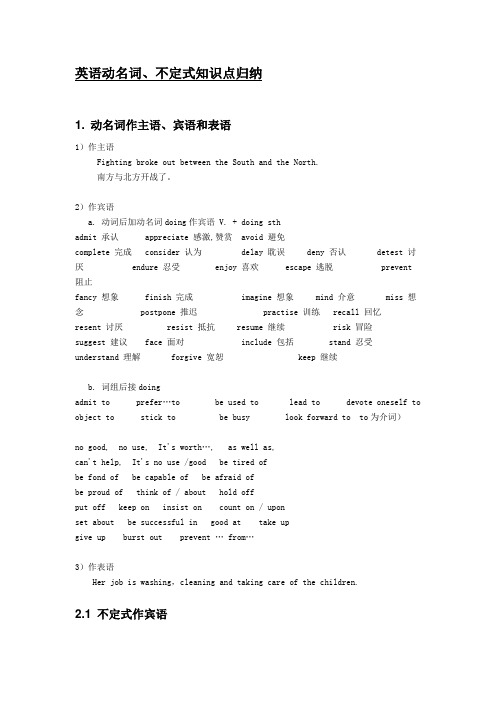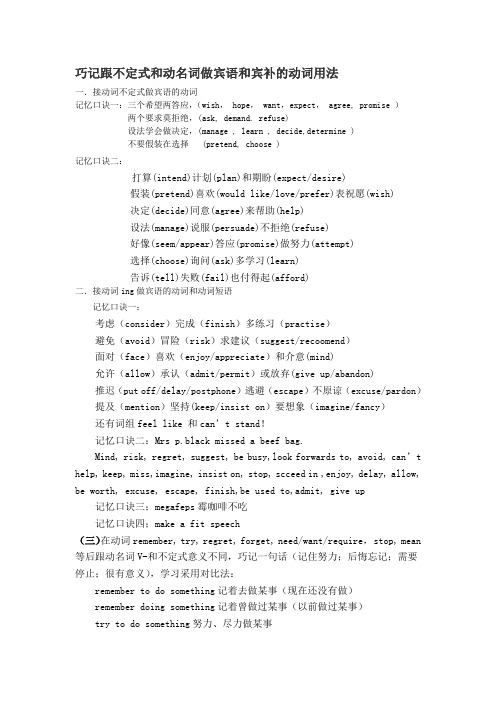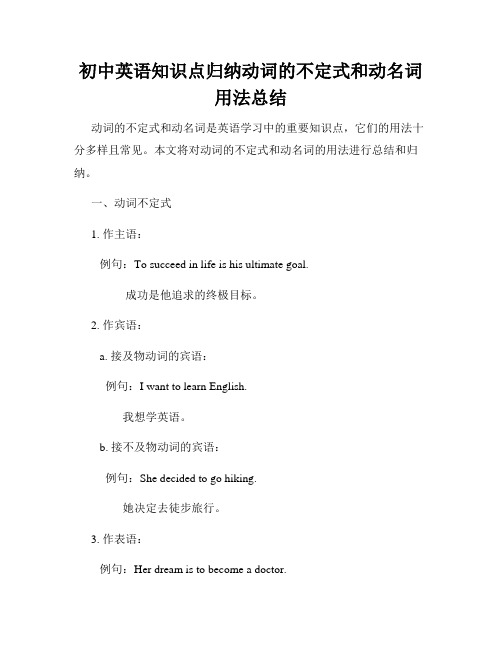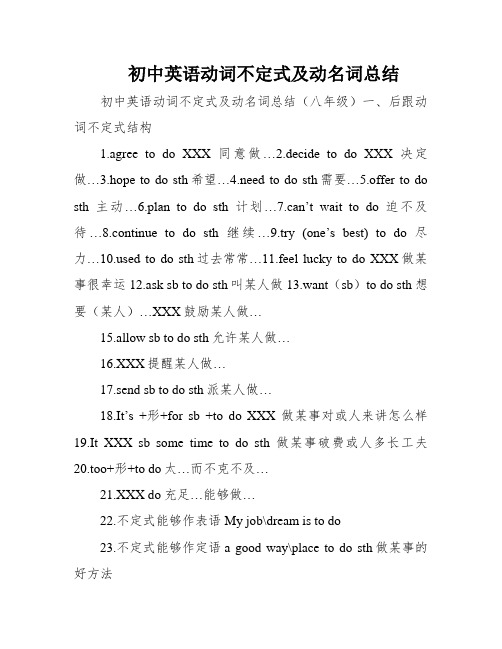(完整版)初中英语的不定式和动名词(整理版)
初中英语动名词和不定式归纳

英语动名词、不定式知识点归纳1. 动名词作主语、宾语和表语1)作主语Fighting broke out between the South and the North.南方与北方开战了。
2)作宾语a. 动词后加动名词doing作宾语 V. + doing sthadmit 承认appreciate 感激,赞赏avoid 避免complete 完成 consider 认为 delay 耽误 deny 否认 detest 讨厌 endure 忍受enjoy 喜欢escape 逃脱 prevent阻止fancy 想象finish 完成 imagine 想象 mind 介意 miss 想念 postpone 推迟 practise 训练 recall 回忆resent 讨厌resist 抵抗 resume 继续 risk 冒险suggest 建议face 面对 include 包括stand 忍受understand 理解 forgive 宽恕 keep 继续b. 词组后接doingadmit to prefer…to be used to lead to devote oneself to object to stick to be busy look forward to to为介词)no good, no use, It's worth…, as well as,can't help, It's no use /good be tired ofbe fond of be capable of be afraid ofbe proud of think of / about hold offput off keep on insist on count on / uponset about be successful in good at take upgive up burst out prevent … from…3)作表语Her job is washing,cleaning and taking care of the children.2.1 不定式作宾语1) 动词+ 不定式afford aim appear agree arrange ask be decide bother care choose come dare demand desire determineexpect elect endeavor hope fail happen help hesitate learn long mean manage offer ought plan prepare pretend promise refuse seem tend wait wishundertake2) 动词+宾语+不定式advise allow appoint believe cause challenge command compel consider declare drive enable encourage findforbid force guess hire imagine impel induceinform instruct invite judge know like orderpermit persuade remind report request require select send state suppose tell think train trust understand urge warn2.2 不定式作主语1) Eg:It's easy (for me) to do that.我做这事太容易了easy, difficult, hard, important, possible, impossible, comfortable, necessary, better;the first, the next, the last, the best, too much, too little, not enough2)It's for sb.和It's of sb.区别1)for sb. 常用于表示事物的特征特点,表示客观形式的形容词,如easy, hard, difficult, interesting, impossible等:It's very hard for him to study two languages. 对他来说学两门外语是很难的。
(完整版)不定式和动名词做宾语

巧记跟不定式和动名词做宾语和宾补的动词用法一.接动词不定式做宾语的动词记忆口诀一:三个希望两答应,(wish, hope, want,expect, agree, promise )两个要求莫拒绝,(ask, demand. refuse)设法学会做决定,(manage , learn , decide,determine )不要假装在选择 (pretend, choose )记忆口诀二:打算(intend)计划(plan)和期盼(expect/desire)假装(pretend)喜欢(would like/love/prefer)表祝愿(wish)决定(decide)同意(agree)来帮助(help)设法(manage)说服(persuade)不拒绝(refuse)好像(seem/appear)答应(promise)做努力(attempt)选择(choose)询问(ask)多学习(learn)告诉(tell)失败(fail)也付得起(afford)二.接动词ing做宾语的动词和动词短语记忆口诀一:考虑(consider)完成(finish)多练习(practise)避免(avoid)冒险(risk)求建议(suggest/recoomend)面对(face)喜欢(enjoy/appreciate)和介意(mind)允许(allow)承认(admit/permit)或放弃(give up/abandon)推迟(put off/delay/postphone)逃避(escape)不原谅(excuse/pardon)提及(mention)坚持(keep/insist on)要想象(imagine/fancy)还有词组feel like 和can’t stand!记忆口诀二:Mrs p.black missed a beef bag.Mind, risk, regret, suggest, be busy,look forwards to, avoid, can’t help, keep, miss,imagine, insist on, stop, scceed in ,enjoy, delay, allow, be worth, excuse, escape, finish,be used to,admit, give up 记忆口诀三;megafeps霉咖啡不吃记忆口诀四;make a fit speech(三)在动词remember, try, regret, forget, need/want/require, stop, mean 等后跟动名词V-和不定式意义不同,巧记一句话(记住努力;后悔忘记;需要停止;很有意义),学习采用对比法:remember to do something记着去做某事(现在还没有做)remember doing something记着曾做过某事(以前做过某事)try to do something努力、尽力做某事try doing something试着做某事(看能否达到预期的结果)stop to do something开始做某事(停下正在做的事,开始做另一事)stop doing something停止做某事(停止正在做的事)regret to do something对将来做的事感到遗憾、惋惜regret doing something对已经做过的事感到后悔mean to do something打算,想,意图…mean doing something意味着want/require/need to be done某事需要做want/require/need doing某事需要做(这时动名词和主语之间有动宾关系,如: The room needs cleaning/needs to be cleaned)can’t help to do sth.不能帮助做某事can’t help doing sth.禁不住做某事动词接不定式和动名词意思一样双方一旦开始(begin, start),无论喜欢与否(like, prefer , hate, dislike)都要继续下去(continue),都不能打算忽视开始的爱(intend, attempt, propose, neglect,commence, love)(四)请牢记在下列固定句式中,动词用V-ing式:There is no point arguing further. 再争辩下去没有意义。
初中英语知识点归纳动词的不定式和动名词用法总结

初中英语知识点归纳动词的不定式和动名词用法总结动词的不定式和动名词是英语学习中的重要知识点,它们的用法十分多样且常见。
本文将对动词的不定式和动名词的用法进行总结和归纳。
一、动词不定式1. 作主语:例句:To succeed in life is his ultimate goal.成功是他追求的终极目标。
2. 作宾语:a. 接及物动词的宾语:例句:I want to learn English.我想学英语。
b. 接不及物动词的宾语:例句:She decided to go hiking.她决定去徒步旅行。
3. 作表语:例句:Her dream is to become a doctor.她的梦想是成为一名医生。
4. 作补语:a. 表示命令、建议、请求等:例句:She told me to wait for her at the gate.她告诉我在门口等她。
b. 表示目的、目标等:例句:He went to the store to buy some groceries.他去商店买一些杂货。
5. 作定语:例句:We need a person to help us with the project.我们需要一个人来帮助我们完成这个项目。
6. 作状语:a. 表示目的、结果、原因等:例句:He studied hard to pass the exam.他努力学习为了通过考试。
b. 表示时间、条件等:例句:I woke up early to catch the bus.我早起为了赶公交车。
二、动名词1. 作主语:例句:Swimming is my favorite sport.游泳是我最喜欢的运动。
2. 作宾语:例句:I enjoy reading books in my free time.我喜欢在空闲时间读书。
3. 作表语:例句:Her hobby is dancing.她的爱好是跳舞。
4. 作补语:例句:His job is teaching English.他的工作是教英语。
初中英语动词不定式及动名词总结

初中英语动词不定式及动名词总结初中英语动词不定式及动名词总结(八年级)一、后跟动词不定式结构1.agree to do XXX同意做…2.decide to do XXX决定做…3.hope to do sth希望…4.need to do sth需要…5.offer to do sth主动…6.plan to do sth计划…7.can’t wait to do迫不及待…8.continue to do sth继续…9.try (one’s best) to do尽力…ed to do sth过去常常…11.feel lucky to do XXX做某事很幸运12.ask sb to do sth叫某人做13.want(sb)to do sth想要(某人)…XXX鼓励某人做…15.allow sb to do sth允许某人做…16.XXX提醒某人做…17.send sb to do sth派某人做…18.It’s +形+for sb +to do XXX做某事对或人来讲怎么样19.It XXX sb some time to do sth做某事破费或人多长工夫20.too+形+to do太…而不克不及…21.XXX do充足…能够做…22.不定式能够作表语My job\dream is to do23.不定式能够作定语a good way\place to do sth做某事的好方法24.不定式能够表目的To get good grades。
I must study hard2、后跟动名词方式1.consider doing sth考虑2.XXX喜爱3.XXX XXX做完某事4.mind doing sth介意5.keep doing sth一直keep on doing sth继续|坚持6.can’t。
doing sth停不下来7.can’t。
help doing sth不由得8.put off doing sth推迟9.give up XXX摒弃10.ba busy doing sth忙于11.have a good time doing XXX做某事很开心12.have XXX做某事很困那13.how \what about doing sth…怎么样14.XXX成功做15.XXX感谢做16.be XXX对做某事感乐趣be afraid of doing sth害怕be good at doing sth善于于XXX对做…自豪be used to doing sth惯于17.sb spend some time (in) doing sth18.XXX三.即可加to do又可加ing,但意思差别大XXX do XXX忘记要做某事(事情还未做)XXX遗忘做过某事(工作已做)XXX记得要做某事(事情还未做)XXX记得做过某事(事情已做)try to do XXX尽力去做某事XXX尝试做某事to do XXX停下了去做某事XXX停止做某事used to do XXX过去常常做某事be used to doing sth气于做某事四.后跟动词原型make sb do XXX使某人做某事let sb do XXX让某人做某事help sb (to) do sth帮助或人做某had better do XXX最好做某事五.便可跟原型,又可跟ingsee sb do XXX看见某人做了某事(事情已发生)XXX瞥见或人正在做某事(工作正在产生)hear sb do XXX听见或人…了(工作已产生)。
(完整word版)初中英语的不定式和动名词(整理版)

初中不定式和动名词一、动词不定式:组成:to +动词原形1. 以下动词只好接不定式作:want 想要 , agree 赞同 , choose 选择 , decide 决定 , expect 希望 ,hope 希望 , earn 学会 , need 必需 , offer 供给 , prefer 情愿 ,+to dopromise 保证 , plan 计划refuse 拒绝 , wish 希望 , would like 想要2.以下动词只好接动名词(即动词 +ing )Enjoy; mind; practice; finish ; suggest ;deny;admit ; keep; spend; feel like + doing sth.enjoy doing sth., 喜爱做某事mind doing sth. 介怀做某事 ,practice doing sth. 练习做某事finish doing sth. 做完某事feel like doing sth. 想要做某事keep doing sth. 坚持做某事have fun doing sth. 尽兴做某事suggest doing sth.建议做某事deny doing sth. 否定做某事admit doing sth. 认可做某事be/get used to doing sth. 习惯做某事look forward to doing sth. 期望做某事spend (in) doing sth. 花销时间做某事can’thelp doing sth. 不由自主做某事be busy doing sth 忙于做某事be worth doing sth 值得做某事prefer doing sth. to doing sth 与对比更喜爱做某事 pay attention to doing sth. 注意做某事3.有些动词后边既可接不定式,也可接动名词,意思同样。
中考英语动词不定式及动名词归纳总结

中考英语动词不定式及动名词归纳总结一、动词不定式的用法1、动词不定式作主语To master a language is not an easy thing. 掌握一门语言不是一件容易的事情.To teach English is my favorite. 教英语是我的爱好.It's my pleasure to help you. 很乐意帮助你.动词不定式作主语时可以放在后面,而用it 作形式主语放在原主语的位置上.It's very kind of you to have given us much help. 你给了我们那么多的帮助真是太好了.It's necessary to find the witness. 有必要找到目击者.Itrs difficult for him to learn English well. 他学好英语很困难.注意:It is adj. of sb. to do sth.是someone is adj. to do sth. 的强调式.即把形容词提到句子的强调地位.这时句中sb.即是形容词的逻辑主语,又是不定式的逻辑主语.It is 形容词for sb. to do sth.中的sb.只能作不定式的逻辑主语.也就是说,sb.既是形容词的逻辑主语,又是不定式的逻辑主语时sb.前面用of,如果sb.只能作不定式的逻辑主语时,sb.前面用for.如:It is very important for you to master a foreign language.你们掌握一门外语是非常重要的.句中的you就只能作不定式的逻辑主语.It is very brave of you to have done it for the soldier.你真勇敢,为士兵做了这件事情. 句中的you是形容词和不定式的共同主语. 用于这一句型的形容词中学课本中出现的还有:careful,careless,clever,courageous,foolish,good,honest, nice, polite, right,silly,wise,wrong,grateful,naughty等.注意:此类形容词绝大多数是说明某人品质、特性或行为方式的主动形容词.2、动词不定式作宾语接动词不定式作宾语的动词有: decide, desire, expect, hope, mean, pretend, promise, refuse, undertake, want, wish, agree, manage等.我们可用这样一个虚构词"merdowphfla",其汉语谐音为"磨豆腐喽" 帮助归纳记忆.每一个字母代表一个英语单词.m-mean(打算),manage(设法);e-expect(期盼);r-refuse(拒绝);d-dare(敢),desire(渴望), determine(决心),decide(决定),demand(要求);o-offer(企图);w-want(想要),wish(希望);p-promise(答应),pretend(假装),plan(计划);h-hope; fail(失败),l-long(渴望),learn(学习); a-ask(要求), arrange(安排).例如:I have decided to be a good teacher. 我决定要当一位好教师.He refused to come to the party. 他不肯来出席这个晚会.That stranger asked to see the manager. 那位陌生人要求见经理.I fear to offend him. 我怕得罪他.I donrt care to see him again. 我不愿再见到他.Werve arranged to drop by at six orclock.. 我们已经安排在六点钟访问.He failed to follow the instructions. 他没有按照说明书来做.The girl had no choice but to cry. 那女孩除了哭以外,就没有别的选择.注意:①在canrt help but, canrt choose but, canrt but,had better, would rather, rather than 和dohhbut/except/besides 结构中,后面的动词不定式符号"to",replica chanel watches;常常省略.例如:Mr. Cheng couldnrt help but leave. 程老师只好离开.I could do other things besides play football after school. 放学后,我除了踢足球还可以做其它事情.The boy can do everything but speak. 那男孩什么都能做,除了说话.You had better leave here for the moment.你最好暂时离开这儿.I would rather stay at home on Sunday 星期天我宁愿呆在家里.He prefers to work on the farm rather than do his homework at home.他宁愿在农场干活也不愿意在家做作业.②动词不定式作宾语,后面又有宾语补足语时,常用it 作形式宾语,而把真正的宾语不定式放在后面.例如:We found it difficult to learn a foreign language. 我们发现学习外语很困难.I think it wrong to come late for class.我认为上课迟到是不对的.③teach, decide, wonder, show, learn, forget, ask, find out, advise, discuss等动词后面可以接what, which, when, where, how, whether 等不定式.例如:He teaches us how to learn English well.他教我们怎样学习好英语.We discussed where to buy the computer.我们讨论了哪里能买这种电脑.He didnrt tell us when to start out. 他没有告诉我们何时出发.④在同一句或联系紧密的对话中,为了避免重复,作宾语、补语的动词不定式再次出现时,to后面的内容常常承前省略(to留下),但如果有助动词have 或be 的任何形式,应该保留原形be或have.例如:mWhord like to go with me? mIrd like to.m谁想跟我一起去?m我.China is not what it used to be.中国已经不过去的中国了.mYou are late. You ought to have come five minutes ago.你迟到了.你应该五分钟以前到.mI know I ought to have.我知道我应该.3、动词不定式作宾语补语例如:We expect you to be with us. 我们希望你和我们在一起.Please ask him to come here quickly. 请叫他快过来.注意:接动词不定式作宾语补足语的情况.①主语ask/ require/ tell/ order/ force/ get/ want/ like/ expect/ advise/ allow/ permit/ forbid sb to do sth.He asked me to work hard for the people.他要求我们为人民努力学习.She tells us not to come late. 她叫我们不要迟到.②主语think/judge/suppose/believe/consider/feel sb to behI think him to be honest. 我认为他诚实.I believe her to be a good student. 我相信她是个好学生.主语think/judge/suppose/believe/consider/feel sb to have donehWe considered him to have been to the U.S.我们认为他去过美国.He is considered to have been to Beijing. 有人认为他去过北京.③主语hear(listen to, see, watch, notice, observe, look at, feel, have, let , make)sb do h即hear, listen to, see, watch, notice, observe, look at, feel, have, let , make 后面接动词不定时作宾语补足语不带to.例如:I saw him go out just now. 我刚才看见她出去了.He made us do a lot of homework.他让我们做很多作业.这些动词可以用下面口诀帮助记忆.不定式作宾补何时不带to?下面口诀给予帮助.二听、五看、一感觉,使役动词有三个,help可带,可不带(to) ,所以把它排在外.二听:hear, listen to五看:see, watch, notice, observe, look at一感觉:feel三个使役动词:have, let, make例如:She felt somebody touch her hair.She let me read her diary.I made him tell the truth.Did you hear him say that yourself?We have to help them (to) clean the town.注意:变为被动语态时要加to.He was made to tell the truth.④主语call on/ depend on/ wait for/ ask for sb to do sth.例如:He called on us to learn from Lei Feng.他号召我们向雷锋学习.He depends on his parents to give him food and clothing.他依靠父母提供吃穿.4、动词不定式作表语What I should do is to finish the task soon. 我应该做的是赶快完成任务.The most urgent thing is to find the boy immediately. 当务之急是马上去找孩子.注意:①不定式作表语,其主语通常是job, work,wish, hope, thought, idea, way, method, aim, duty, intention, purpose, suggestion 等.②主语和表语同为不定式,其含义往往一个是条件,另一个是结果.Not to grasp firmly is not to grasp at all. 抓而不紧等于不抓.What I wish is to learn English well. 我所希望的是把英语学好.To see is to believe. 百闻不如一见.③不定式结构作表语时,通常带to,但是当主语部分有一个动作动词do时(这个do 可以是限定动词形式,也可以是非限定动词形式,而且不论是什么时、体形式均可),用作表语的动词不定式中的to可以省略.例如:What we need to do is (to) reduce our use of energy and use natural forms of energy which are free and which will last for ever. 我们要做的是减少能源的消耗和利用各种天然能源.天然能源是即不花钱,又取之不尽,用之不竭的.All I did is (to) empty the battle. 我只需倒空瓶子.What he has done is (to) serve the people. 他做的事就是救人.All we have to do is (to) push the button. 我们只需要按一下按钮.5、动词不定式作定语There are many ways to solve the problem. 有许多方法能解决这个问题.I have something important to tell you. 我有重要的事情要告诉你.注意:①下面词语chance, wish, courage, need, promise, time, opportunity, way, the first, the secod, the last, the only one 等常常接动词不定式作定语.例如:He is always the first to arrive and the last to leave.他总是第一个到达,最后一个离开.There is no need to ask him the question.没有必要问他这个问题.②不定式与它所修饰的名词在逻辑上是主谓关系.There is no one to look after her.没有人照顾他.He needs a person to talk with him.他需要一人和他谈话.③不定式与它所修饰的名词在逻辑上是动宾关系.She s looking for a room to live in.她再找房子住.He has a lot of work to do today.他今天有很多工作要做.6、不定式作状语不定式作状语可以作目的状语、原因状语、结果状语、方式状语、表程度状语. English is difficult to learn.英语很难学习.The problem is easy to deal with.这问题很好处理.Itrs too dark for us to see anything. 太黑我看不见东西.The question is simple for him to answer. 问题简单要他回答不值得.We went to the hospital to see our teacher. 我们去医院看了我们的老师.She is making a test to get a kind of useful medicine from a Tibet flower.她在做试验,google,从一种西藏花中提取某种有用的药物.①不定式作目的状语可以用in order to或so as to 表示,但so as to 不能放在句首. 例如:In order to go to key university, he studies hard.为了上重点大学,他学习很用功.He sat in the front in order to/so as to see more clearly.=He sat in the front so that/in order that he could see more clearly. 为了看得更清楚,他坐在前排.(目的)He went to a big city in order to/ so as to find a good job.=He went to a big city so that/in order that he could find a good job. 为了找一个好工作,她去了大城市.(目的)②动词不定式作结果状语常常可以用以下结构.so as to;so adj/adv as to doh 如此hh以致;enough to do h足够做hh;too adj /adv to doh太hh而不能hh;suchhas to doh如此hh以致例如:He sat in the front so as to see more clearly.=He sat in the front so that he saw more clearly. 他坐在前排,结果看得更清楚.(结果)She got up early so as to catch the first train.=She got up so early that she caught the first train. 他起床很早结果赶上了早班车.(结果)He was so kind as to give me a lot of help.他很善良结果帮了我很多忙.The boy is old enough to join the army.那孩子达到了参军的年龄.He is too young to go to school.他还不到上学的年龄.He is such a good man as to help the old woman get off the bus.他就是这样一个好人扶老人下汽车.③动词不定式作结果状语表示一种出乎意料的结果常常用only to do 结构.例如:He hurried to the station only to find the train had left.他匆匆赶到车站,chanel watches prices,结果发现火车已经走了.We waited for two hours, only to be told to come the next day.我们等了两个小时,结果告诉我们次日再来.He arrived late only to find the train gone.I visited him only to find him out.二、动名词的用法动名词是由动词原形ing 构成,形式同现在分词形式一样,其否定形式是not 动词原形ing.1、动名词作主语:Talking like that is not polite. 那样谈话不礼貌.Learning from others is important. 向别人学习很重要.Putting on more clothes is not so good . 多穿衣服不一定好.动名词作主语通常用一般式,可以像动词不定式一样,用it 先行词代替,而把动名词写在后面.It's no use waiting here, let's go home. 在这儿等着也没用,我们回家吧.It's very difficult climbing this mountain. 爬这座山很困难.2、动名词作表语The nurse's job is looking after the patients. 护士的工作是护理病人.Seeing is believing. 眼见为实.3、动名词作定语She is studying in the reading room. 她在阅览室学习.He slept in the sleeping bag. 他在睡袋里睡觉.4、动名词作宾语Please stop smoking in the house. 请不要在家里抽烟.I like reading in the forest. 我喜欢在树林里读书.Do you mind my opening the windows? 你介意我打开窗户吗?She is found of collecting stamp. 她喜欢集邮.下列动词接动名词:avoid, consider, delay, deny, dislike, enjoy, escape, forgive, finish, imagine, keep,mind, miss, pardon, prevent, resist, suggest, stand, understand, can't help, 等.我们可用这样一个虚构词"madpsfameicarfe",其汉语谐音为"卖的不是发霉咖啡"帮助归纳记忆.每一个字母代表一个英语单词.m-mind(介意), a-avoid(避免), d-delay(推迟), p-practise(练习),s-suggest(建议), s-stand(忍受),s-stop(停止),f-finish(完成),f-forgive(原谅) ,a-advise(建议), m-miss(错过), e-escape(逃脱),i-imagine(设想),c-canrt help(禁不住), a-admit(承认), r-risk(冒险), f-fancy(认为,想象),e-enjoy(喜爱).b.下列短语动词接动名词be fond of, be good at, be worth, devote to, feel like, get used to, give up, have difficulty, insist on,look forward to, pay attention to, put off, refer to等.He is fond of playing basketball.他喜欢打篮球.I have difficulty learning English.我学习英语有困难.c.介词后面接动名词What about going to the cinema? 去看电影怎么样?On seeing his teacher, he jumped off his bike. 他一看见老师就下自行车..几个特殊情况:1) 有些动词的后面既能跟动名词又能跟不定式,区别不大.他们是: begin, start, continue. Like, love, dislike, hate, prefer 等.He began to learn English at the age of five.He began learning English at the age of five.他五岁开始学习英语.注意:(1)begin, start 本身是进行式、后面的动词是see, understand, realize 等后面跟动词不定式. 表示习惯的, 一般性的多接动名词,表示某一特定的或具体的行动,多接动词不定式.He is beginning to give class.他就要上课了.He began to realize he was wrong.他开始意... 相关的主题文章。
初中英语知识点归纳动名词和不定式的用法
初中英语知识点归纳动名词和不定式的用法初中英语知识点归纳:动名词和不定式的用法动名词(Gerund)和不定式(Infinitive)是初中英语中常用的语法形式,它们在句子中有着不同的用法和作用。
下面对动名词和不定式的用法进行归纳总结。
一、动名词的用法:1. 作主语:动名词可以作为整个句子的主语。
- Running is good exercise. (跑步是一项很好的运动。
)- Singing makes me happy. (唱歌使我开心。
)2. 作宾语:动名词可以作动词的宾语。
- I enjoy playing basketball. (我喜欢打篮球。
)- He hates doing homework. (他讨厌做作业。
)3. 作介词的宾语:动名词可以作介词的宾语。
- She is good at dancing. (她擅长跳舞。
)- They are interested in painting. (他们对绘画感兴趣。
)4. 在某些固定短语中:动名词常用于一些固定搭配中。
- I look forward to seeing you. (我期待见到你。
)- He is busy with studying. (他忙于学习。
)5. 作宾补:动名词可以作及物动词的宾补。
- She found it interesting watching movies. (她认为看电影很有趣。
) - They made her captain of the team. (他们让她成为队长。
)二、不定式的用法:1. 作动词的宾语:不定式可以作动词的宾语。
- I want to study abroad. (我想出国留学。
)- He loves to play the piano. (他喜欢弹钢琴。
)2. 作形容词的定语:不定式可以作名词或代词的定语。
- This is a good book to read. (这是本值得阅读的好书。
初中英语知识点归纳动词的不定式与动名词的用法
初中英语知识点归纳动词的不定式与动名词的用法动词的不定式与动名词是英语中常见的两种动词形式,它们在句子中有各自独特的用法。
本文将对初中英语中动词的不定式与动名词的用法进行归纳总结。
一、动词的不定式的用法1. 不定式作为主语不定式可以作为句子的主语,常用的句型有:- To study English is important.- To succeed needs hard work.- To learn a foreign language is challenging.2. 不定式作为宾语不定式可以作为及物动词的宾语,常用的动词有:- want, hope, plan, decide等。
例如:- She wants to go shopping.- They hope to win the game.- I plan to visit my grandparents next week.3. 不定式作为表语不定式也可以作为句子的表语,常用的句型有:- The best way to learn is to practice.- His dream is to become a doctor.- My goal is to travel around the world.4. 不定式作为状语不定式可以作为状语修饰动词、形容词或副词。
常用的句型有:- I woke up early to catch the train.- She was too tired to continue working.- He spoke slowly to make sure everyone understood.二、动名词的用法1. 动名词作为主语动名词可以作为句子的主语,常用的句型有:- Swimming is my favorite sport.- Reading books is a good way to relax.- Playing basketball requires teamwork.2. 动名词作为宾语动名词可以作为及物动词的宾语,常用的动词有:- enjoy, like, love, hate等。
(最新整理)初中英语动名词和动词不定式归纳
初中英语动名词和动词不定式归纳编辑整理:尊敬的读者朋友们:这里是精品文档编辑中心,本文档内容是由我和我的同事精心编辑整理后发布的,发布之前我们对文中内容进行仔细校对,但是难免会有疏漏的地方,但是任然希望(初中英语动名词和动词不定式归纳)的内容能够给您的工作和学习带来便利。
同时也真诚的希望收到您的建议和反馈,这将是我们进步的源泉,前进的动力。
本文可编辑可修改,如果觉得对您有帮助请收藏以便随时查阅,最后祝您生活愉快业绩进步,以下为初中英语动名词和动词不定式归纳的全部内容。
1。
动词+doing(只能加doing的动词) Like/dislike/enjoy/have fun +doing喜欢做mind (sb) doing介意做imagine doing 想象做suggest doing建议做practice doing练习做finish doing结束做what about/ how about doing sth 做某事如何Thank you for doing sth。
为…感谢某人at the beginning of 的起初;……的开始keep/go (on) /continue doing持续做can't help doing情不自禁做can’t stand doing不能忍受做can’t stop doing sth 忍不住做某事feel like doing想要做go +doing (go shopping)去做某事no +doing 禁止做某事be worth doing 值得做be busy doing sth 忙于做某事spend time/money (in) doing 花费时间做某事waste time/money (in) doing浪费时间做某事consider doing sth 考虑做某事havetrouble/difficulty/problems/experience (in) doing 做某事有困难/有经验used to do 过去常常做某事be /get used for doing sth = be used to do sth. 被用来作某事be /get/used to doing 习惯于做某事pay attention to doing 注意做某事hold on to doing sth 坚持做某事look forward to doing期望做某事be interested in doing=take an interest in doing对———感兴趣be good at doing sth= do well in doing sth.擅长作某事about: be worried about doing担忧做be embarrassed about doing尴尬做be annoyed about doing反感做with: be pleased with doing对做-——满意prefer doing to doing宁愿-也不愿without: without doing没做from: stop sb (from) doing=prevent sb from doing=keep sb from doing(但keep sb doing使某人不停的做) by: by doing通过做22 2. 动词+doing和to do 意义无大区别begin doing/ begin to dostart doing/ start to do开始做continue doing/to do持续做like doing / like to dolove doing / love to do 喜欢做hate doing/ hate to do讨厌做3 3. 动词+doing和to do意义不同forget doing 忘记做过某事forget to do忘记去做某事(还未做)remember doing 记得做过某事remember to do记得要去做某事(还未做)stop doing=give up doing sth 停止做某事stop to do停下来去做另一件事try /try one’s best to do尽力做need doing需要被做(主语指物)need to do 需要做(主语指人)4. 动词+to doagree to do同意做want to do想要做would like to do想要做,愿意做decide to do决定做hope/ wish to do希望做plan to do 计划做be supposed to do sth =should do sth应该做某事learn to do学会做be /make sure to do sth 确定做某事offer to do 主动要求做help (to) do /help sb with sth帮着做afford to do担负得起做refuse to do拒绝做regret to do 遗憾地做dare to do敢做seem to do似乎做promise to do许诺做can't wait to do迫不及待做pretend to do假装做used to do过去常常做get to do逐渐做have sth /nothing to do 有某事要做it’s one’s duty to do sth 做某事是某人的责任make up /change one’s mind to do sth.下定/改变某人决心做某事the way to do sth = the way of doing sth 做某事的方法 the way to +地方去哪的路其他用法:疑问词+ to dowhen/where/what/how/which/whether…to do形式主语:sb+think/feel/find…it+形容词+ to doIt is +形容词+of/for sb.+ to dotoo+形容词+to do sth =not enough to do= so thatit takes sb. some time to do sth。
初中英语的不定式和动名词(整理版)
初中英语的不定式和动名词(整理版)2)XXX.记得去做某事(还未做)3) XXX停止做某事(正在做)4) to do sth.停下来去做某事(为了去做)5)try XXX.试着做某事(尝试)6)try to do sth.努力去做某事(尽力)动词不定式是英语中的一种非常重要的语法结构,它可以作主语、宾语、表语、定语、状语等。
掌握好动词不定式的用法,可以使我们的英语表达更加地准确、地道。
在使用动词不定式时,需要注意动词后面要接不定式,还是动名词,以及不同的动词接不同的结构。
首先,我们需要知道哪些动词只能接不定式作宾语。
这些动词包括want、agree、choose、decide、expect、hope、earn、need、offer、prefer、promise、plan、refuse和would like等。
我们需要记住这些动词,以便在使用时不出错。
其次,还有一些动词只能接动名词作宾语,如enjoy、mind、practice、finish、suggest、deny、admit、keep、spend 和feel like等。
这些动词的用法也需要我们掌握。
除此之外,还有一些动词既可以接不定式,也可以接动名词,但意思有所不同。
例如,begin/start to do sth.和begin/start doing sth.的意思都是“开始做某事”,但前者表示动作的开始,后者则表示动作的进行。
同样地,like/love to do sth.和like/love doing sth.的意思也不同,前者表示偏好,后者则表示喜欢的状态。
最后,我们需要注意一些动词后接不定式或动名词时的区别。
例如,XXX和XXX的意思不同,前者表示记得已经做过的事情,后者则表示记得要去做某事。
类似地。
doing。
to do sth.的意思也不同,前者表示停止正在进行的动作,后者则表示停下来去做某事。
1.Remember to do something means to keep in mind that you need to do something that you haven't done yet.2.et doing something means that you have done something。
- 1、下载文档前请自行甄别文档内容的完整性,平台不提供额外的编辑、内容补充、找答案等附加服务。
- 2、"仅部分预览"的文档,不可在线预览部分如存在完整性等问题,可反馈申请退款(可完整预览的文档不适用该条件!)。
- 3、如文档侵犯您的权益,请联系客服反馈,我们会尽快为您处理(人工客服工作时间:9:00-18:30)。
初中不定式和动名词一、动词不定式:构成:to + 动词原形1. 下列动词只能接不定式作:want 想要, agree 同意, choose 选择, decide 决定, expect 期望,hope 希望, earn 学会, need 必要, offer 提供, prefer 宁愿, +to dopromise保证, plan 计划refuse 拒绝, wish 希望, would like想要2. 下列动词只能接动名词(即动词+ing)Enjoy; mind; practice; finish;suggest ;deny;admit ; keep; spend; feel like + doing sth.enjoy doing sth., 喜欢做某事mind doing sth. 介意做某事,practice doing sth. 练习做某事finish doing sth. 做完某事feel like doing sth. 想要做某事keep doing sth. 坚持做某事have fun doing sth. 尽情做某事suggest doing sth.建议做某事deny doing sth. 否认做某事admit doing sth.承认做某事be/get used to doing sth. 习惯做某事look forward to doing sth. 盼望做某事spend…(in) doing sth. 花费时间做某事can’t help doing sth. 情不自禁做某事be busy doing sth 忙于做某事be worth doing sth 值得做某事prefer doing sth. to doing sth 与…相比更喜欢做某事pay attention to doing sth. 注意做某事3.有些动词后面既可接不定式,也可接动名词,意思相同。
如:begin/start to do sth.= begin/start doing sth开始做某事,like/love to do sth= like / love doing sth. 喜欢做某事;hate to do sth. =hate doing sth.憎恨做某事4. 有些动词后接不定式或名词时,意思不同。
如:1)remember doing sth. 记得作过某事(某事已做过)remember to so sth.记住去做某事(某事还没做)2)forget doing sth. 忘了作过某事(某事已做过)forget to do sth. 忘了去做某事(某事还没做)3)try to do sth.=do one’s best to do sth. 尽力去做某事try doing sth. 尝试做某事4)stop doing sth. 停止做某事(停止正在做的事)stop to do sth.停下来做某事(停止的事去做另外的事)5)go on doing sth. 继续做某事(同一件事)go on to do sth. 接着去做某事(不同的事)5.下列动词跟动词不定式充当宾语补足语:vt.+sb. to do sth. vt.+ sb.+not to do sth.Want/ask/ tell /order/ allow/ wish/beg/advise / call /invite +sb. to do sth.She told me to buy a ticket.她让我去买张票My mother often tells me not to go out at night.6.help 后的不定式可带to, 也可不带toThe teachers helped the students (to) learn English well. 那些老师帮助学生学好英语。
He often helps his mother (to) tidy up the room.他经常帮助他妈妈整理房间。
7. 动词不定式省to的情况一感feel二听hear, listen to +sb. do sth.三使have, let, make四看see, watch, look at, notice常考短语:hear/see/ make / let sb. do sth.被动语态:Sb. be heard/ seen/made/let to do sth.(变成被动语态时补回to)I often see him help others. He is often seen to help other by me.二、动词不定式的句式:1..动词不定式作主语,主语较长时,常用it作形式主语,而将真正的主语放在句。
It + is/was+adj.+(for sb.) + to do sth.To learn English well is useful. = It’s useful to learn English well.学好英语是有用的。
To protect environment is important for us.= It’s important for us to protect environment.对于我们来说保护环境是很重要的。
2. It is / was + adj.(kind / good/ nice/ clever) + of sb. +to do sth.It’s very kind of you to help me. =You are very kind to help me你帮助我真是太好啦。
It’s very clever of you to do like that.=You are clever to do like that你那样做真的太聪明啦。
这个句型的形容词为表示人的品格,气质之类的词。
可以等于句型:sb. is / was + adj. +to do sth.3. It takes ( took , will take ) sb. some time to do something. (做某事花费某人…时间)4.. 主语+ find / think + it +形容词+ (for sb.) + to doI find it easy to read English every day. 我发现每天读英语和容易的。
He felt it hard to sleep.他觉得很难入睡。
I think it very interesting to learn English. 我认为学英语很有趣。
We found it impossible to cross the river. 我们发现过河是不可能的。
5.不定式作表语表示主语的“职业、职责或性质”等Her job is to clean the hall. 她的工作就是打扫大厅。
My dream is to be a teacher.我的梦想是当一名教师。
6.不定式作状语的用法He worked day and night to get the money.(表目的)他日夜工作来赚钱。
He is too young to go to school. (表结果)他太小以致不能上学。
They were very sad to hear the news.(表原因)听到这个消息他们非常伤心。
The question is simple for him to answer.(表程度)这个问题对他来说太容易回答了。
7. 动词不定式可以和疑问词who, what, which, when, how, where(why除外)等连用,构成不定式短语。
Can you tell me how to get to the post office?I didn’t know what to do next.How to learn English well is the question that we all want to ask.The question is when to get there.What to do 与how to do 的区别:I don’t know what to do next?我不知道下一步该做什么。
(What to do后没有sth.)I don’t know how to use this machine.我不知道怎么样使用这部机器(how to do +sth.)三、动名词(动词+ing)作用相当于名词。
(可以作主语、宾语、表语和定语)1.Reading is an art. 读书是一种艺术。
(作主语)2.Your task is cleaning the windows.你的任务就是擦窗户。
(作表语)3. He likes swimming.(作宾语)4.a washing machine 洗衣机,a reading room 阅览室(作定语)非谓语动词(不定式和动名词)专练()1. Mother told her son in the street.A. not playB. to not playC. doesn’t playD. not to play( ) 2. His wish was a scientist.A. to becomesB. becomesC. becomeD. to become( ) 3. It’s raining hard. You’d better .A. go outB. not go outC. not to go outD. to not out( ) 4. Do you know washing machine?A. where to getB. to where to getC. where getD. to where get( ) 5. The students don’t know next.A. how toB. what to doC. what doD. do what( ) 6. Would you mind me how English words?A. telling , to rememberB. telling, rememberC. tell, to rememberD. tell, remember( ) 7. Mr. Brown asked us to stop , and we stopped him at once.A. talking, to listen toB. to talk, to listenC. talking, listeningD. talk, listen( ) 8. --What are you going to be after you finish college?--I’m going to be a singer, but my parents me to be a doctor.A. hopeB. wantC. makeD. let( ) 9.-- I saw Betty go to Grandpa Zhang’s home just now.--Yes , she is often seen the old man with his housework.A. helpB. to helpC. helpsD. helped( ) 10. ---Do you need to get there before ten? ---No, I .A. don’t have toB. don’t needC. can’tD. mustn’t( ) 12. After she finished the letter, she went to bed.A. to writeB. writingC. writtenD. wrote( ) 13. It was very late at night, he still went on .A. worksB. workedC. workingD. work( ) 14.-- Have you finish the book?--Not yet. I’ll try it to you before Friday.A.reading, returning,B. to read, to returnC. reading, to return,D. to read, returning ( ) 15. The old man is strong enough. He prefers to .A. walking, ridingB. walk, rideC. to walk, rideD. walking, ride( ) 16. I have quite a few people .A. take care ofB. to take care ofC. to take careD. take care( ) 17. I usually forget the door, but I remembered it when I left yesterday.A.closing, closingB. to close, to closeC. to close, closingD. closing, to close ( ) 18. I’m made thirsty by the strange thing.A. feelB. feelingC. to feelD. felt( ) 20. I’m sorry your friend is ill.A. hearB. to hearC. listenD. to listen( ) 21. ---Will you please tell John to come to my office? --- .A. Yes, I doB. I’ll be gladC. Thank youD. I’ll be glad to( ) 22. Have you read the book? It’s worth .A. readB. to readC. readingD. to reading( ) 23. This box is too heavy for the child .A. to carry itB. to carryC. carryingD. carrying it( ) 24. The young man is old enough the army.A. joinB. joiningC. to joinD. joins( ) 25. The flowers need .A. wateringB. to waterC. waterD. watered( ) 27. --Have you finished the work?--Not yet, but no matter how hard it is, we’ll keep until we make it.A. failedB. tryingC. triedD. falling( ) 28. --Do you want to eat something? -- . thanks. I am feeling sick now. I don’t feel like .A. Yes, eating somethingB. No, to eat anythingC. Yes, to eat anythingD. No, eating anything( ) 29.-- Do you still remember me sometime in Shanghai?--Yes, of course. Two years ago.A. to seeB. seeC. seeingD. saw( ) 30. It took us a long time Hawaii, but we thought the journey was enjoyable.A. to getB. gettingC. to reachD. reaching( ) 31. I t’s important the piano well.A. of him to playB. for him to playC. of him playingD. for him playing( ) 32. Good manners usually help people to each other.A. get on well withB. get startedC. get togetherD. get ready( ) 33. Our teacher always tell us more English in and out of class.A. speakB. spokenC. to speakD. speaking( ) 34. My mother often asks me early.A. get upB. got upC. getting upD. to get up( ) 35. --Shopping with me? --Sorry, I have a lot of clothes .A. to washB. washedC. washD. to be washed( ) 36. She needs some paper to .A. writeB. write inC. write withD. write on( ) 37. Listening! Can you hear a baby ?A. cryB. to cryC. cryingD. cries( ) 38. When people want to relax themselves, they prefer TV or listen to music rather than newspapers.A. watching, readB. watching, to readC. to watch, readD. to watch, reading ( ) 40. Will you go shopping together with us this Saturday, Jenny? Yes. .A. I doB. I’d like toC. I’d love to doD. I’m busy。
